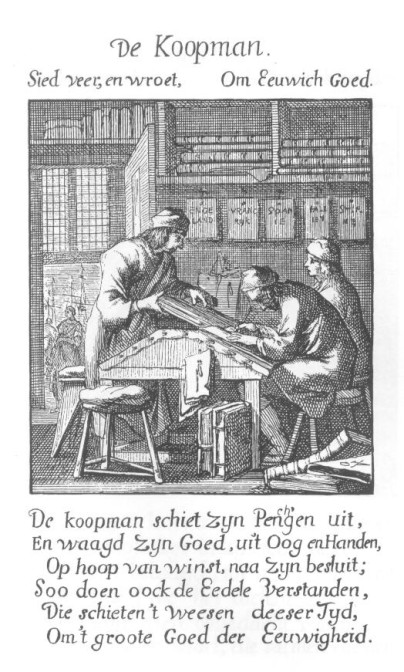
The Koopman, etching by Jan and Casper Luyken, circa 1694. Credits: Picturing the Past
A koopman was a merchant, with the plural being kooplieden. Kooplieden could trade in all sorts of goods, ranging from spices from the Far East, timber from the Baltic or fur from the Americas. Others traded in domestic products like grain, cloth or glassware.
One of the nice things about having a koopman in your tree is that they left much more records than the average person: purchase contracts, partnership agreements, declarations of debts, powers of attorney and a range of other contracts regarding their business. You might be surprised to find out how extensive their trade network was. Merchants were also wealthier than the average person and more likely to have a prenuptial agreement or leave a last will.
All these types of records were created before a public notary. Before 1811, not all regions had public notaries so in that case you will find these records in the archives of the local courts, in the section for voluntary cases.
When business deals went sour you can also find them in court records, in the section for civil suits.


I wonder if Koopman is cognate to Kaufman? If so, I must have had some in my past, somewhere. 🙂
Hi Teresa,
Yes, Kaufman (or Kaufmann) is the German translation of Koopman (Merchant). So it would definitely look like you had a merchant in your past!
My ancestors Benjamin Coster on my fathers line were Jewish cigar makers from Holland. Just found a long family tree which states my earlier grandparents the occupation was described as Koopman. Im wondering what i can find out about this way of earning a living. It sounds enterprising, but was it seen as slightly dishonest.
A merchant was someone who sold merchandise. Nothing shady about that, though I’m sure there were rotten apples like in any profession. As Jews, they would have been barred from regulated professions since they were not allowed to join a guild. Merchant was a pretty common occupation for a Jewish person.
Thanks for the reply. Feel better no criminal elements in the forebears. Always loved being a salesperson myself. So must be in the DNA.
One my grandfathers had the surname Coopman (anglicised from Koopman). According to (oral) family history his ancestor worked for the Dutch East India Company and settled in Ceylon (now Sri Lanka) in the mid-late 1600s and originated in Belgium. How common is the surname there compared to the Netherlands? We were told he was Catholic (as is my whole family on that side). Are there Christians/Catholics who always had that name too? Is it originally a Jewish name?
I was told a story about a soldier long ago (I guess around the 18 or 1700s) that was honored with the last name Achttien. Is there anything you can tell me about how that name came to be? I know it means 18 in dutch, but i wonder if there are any other stories that go along with it. Was that back when there were Vikings?